Sustainable Fisheries & Aquaculture
The primary objectives of our seafood sourcing policy are:
- Continue to improve sustainably sourced seafood from either wild fisheries or farmed aquaculture in ways that meet current demands without compromising the availability of scarce resources for future generations.
- Continue to value the human rights, safety, and dignity of the people who produce, process, and harvest the products we sell.
- Consider these factors when sourcing seafood: the condition of fish stocks (biomass); the protection of and respect for the marine, coastal, and freshwater ecosystems; governmental and regulatory agency guidelines; and practices that will mitigate or limit environmental impacts associated with aquaculture and fishing practices. Traceability programs are key to identifying these factors.
As science and industry evolve, we will continue to refine these global policies.

SOURCING & TRACEABILITY

We have implemented an annual seafood survey for many of our global seafood suppliers, capturing key information such as species, catch/farm location, catch/farm method and eco-certification. We previously collected information from suppliers that provided products for our U.S. locations. We’re currently collecting information from suppliers that provide seafood products to all of our global Costco locations. From this survey, we are able to better assess our impact and progress towards our goals.
The seafood industry is under increasing pressure to make its complex supply chains more transparent. At Costco, we are committed to being able to trace our Kirkland Signature™ farmed shrimp products to source farms in order to provide the traceability needed to ensure our products are produced in a more environmentally and socially responsible way. Through piloting end-to-end traceability systems like TruTrace, we can more readily understand the connection between the seafood we display on our shelves and the people and places that helped produce it.
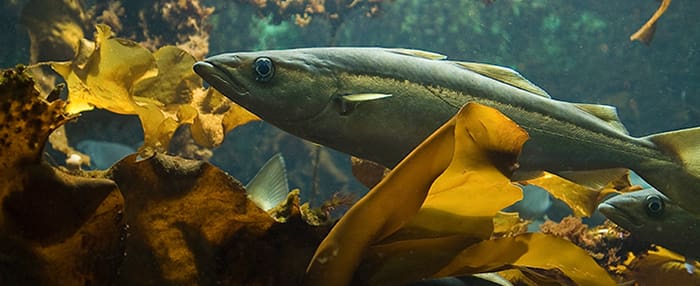
WILD SPECIES
We do not sell certain wild species that have been identified at great risk, unless our sources are certified by the Marine Stewardship Council (MSC). Currently, those species are:
- Atlantic cod
- Atlantic halibut
- Chilean sea bass
- Greenland halibut
- Grouper (Epinephelus morio)
- Orange roughy
- Redfish (sourced outside of U.S. Fisheries)
- Shark
- Skates and rays
- Swordfish (sourced outside of U.S. Fisheries)
- Bluefin tuna
If we decide in the future to rely on other certifying organizations and/or other credible sources that report on the status of these or other species in our procurement, we will disclose their identity and disclose that certification and/or verification on the packaging.
We continue to examine whether there are other species that we should cease to sell because of documented concerns of risk for the species or habitat.
Wild Salmon
Beginning with the 2019 fishing season and until further notice, we’ve committed to not sell Wild King Salmon (also known as Chinook Salmon) sourced from the Salish Sea (formerly known as Puget Sound), due to documented concerns related to its decline.
In Alaska, the sustainable management of salmon is protected by the Alaska State Constitution and serves as a model for continuous improvement of sustainable seafood production. Costco supplier Trident Seafoods maintains full ownership and control of the Alaskan salmon it provides to Costco. Learn more about this product at our Seafood & Aquaculture products page.
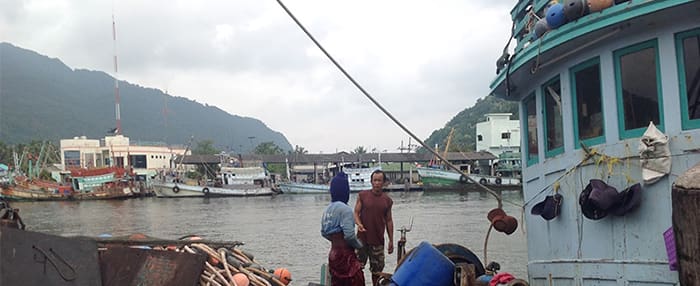
FISHERY IMPROVEMENT PROJECTS
Fishery Improvement Projects (FIPs) are alliances of stakeholders – retailers, processors, suppliers, producers and/or catchers, government, NGOs, and academia – that work to resolve aspects of the fishery that do not currently meet the MSC standard. The FIP process works with stakeholders to:
- Evaluate the fishery’s performance to determine challenges and improvements needed in the fishery
- Agree on a set of actions that should be undertaken to improve the fishery so it can meet the MSC standard
- Work collaboratively to implement the actions and publicly track progress
For fisheries that do not currently meet the MSC standard, we encourage our suppliers to participate in comprehensive FIPs as a step toward MSC certification. Costco supports FIPs through participation in FIP meetings, letters to governments and/or fisheries participants, and financial contributions. Fisheries and industry members that are actively engaged in making continued progress in a FIP and demonstrate good management through the supply chain receive strong consideration in our purchasing decisions. Costco requires FIPs to be verified and monitored as credible by publicly reporting on FisheryProgress.org.
Costco Supported FIPs
From 2016 to 2021, Costco contributed $443,000 to support Fishery Improvement Projects (FIPs). Costco works directly with the World Wildlife Fund (WWF) to support the following FIPs:
- Spiny Lobster - Honduras
- Spiny Lobster - Nicaragua
- Spiny Lobster - Brazil
- Spiny Lobster - Belize
- Mahi Mahi - Ecuador
- Mahi Mahi - Peru
- Mahi Mahi - Taiwan
- Mahi Mahi and Yellowfin Tuna - Costa Rica
- Tuna and Swordfish - Sri Lanka
- Corvina - Suriname
- Octopus - Morocco (FIP in development)
- Octopus - Philippines (FIP in development)
- Octopus - Mauritania (FIP in development)
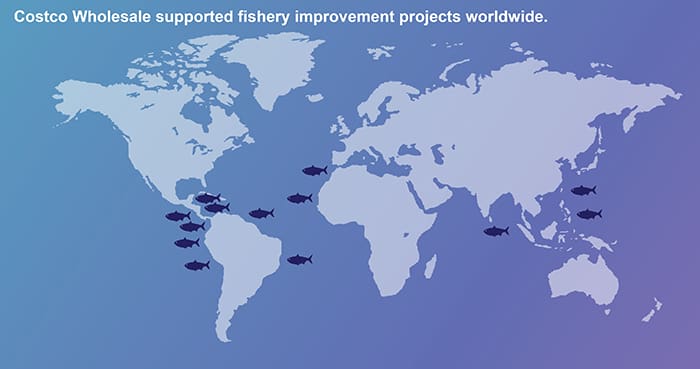
Costco or Costco suppliers also purchase products from these FIP fisheries. Over time our sourcing from individual FIPs will vary, depending on market conditions and other factors.
Fishery Success Stories
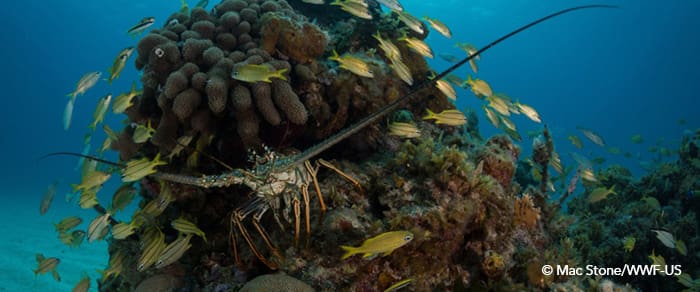
In 2018, through the hard work of our lobster suppliers, the Bahama spiny lobster fishery was certified by the Marine Stewardship Council (MSC) to meet its standards.
More information can be found in this FIP success story video and WWF article, Certification Yields Greater Resilience.
The Honduras and Nicaragua spiny lobster trap fisheries have been working on improvements in each country since 2013 to move the fisheries towards meeting the MSC standard. In 2020, the fishery management agencies in both countries combined forces to gather catch data from processing plants, fishers, and government databases, and in 2021 they completed the first-ever binational spiny lobster stock assessment to determine the health of the shared lobster stock. Results showed that the stock is still being maintained at a healthy level, but scientists cautioned that additional measures should be implemented in both countries to ensure the lobster population remains healthy.

CANNED TUNA
Kirkland Signature™ Albacore canned tuna suppliers are participants in the International Seafood Sustainability Foundation (ISSF), which is undertaking science-based initiatives for the long-term conservation and sustainable use of tuna stocks, reducing bycatch and promoting ecosystem health. Each participating company is audited by a third party for compliance with ISSF conservation measures.
Costco is a founding member of the Seafood Taskforce and works in collaboration with other member companies and industry stakeholders to improve working conditions and the recruitment process for migrant workers on fishing vessels.
Learn more about the STF’s work on Responsible Recruitment.
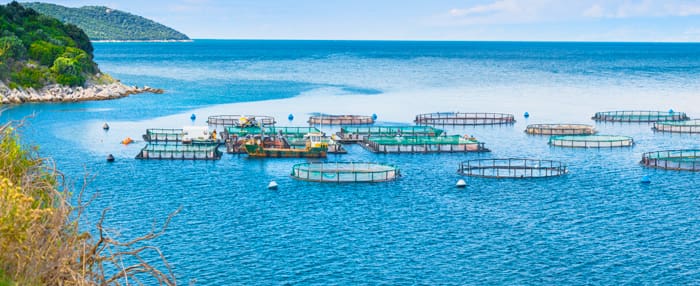
Aquaculture
From 2016 to 2021, Costco has contributed $310,000 to WWF to support and implement Aquaculture Improvement Projects.
We believe that farmed seafood should be an integral part of our business, that aquaculture is a critical source of affordable protein now and in the future, and that farming can be done in a sustainable, responsible manner with reduced impacts on the environment and local communities.
Farmed Shrimp
Costco has been an active participant in the implementation of the Aquaculture Stewardship Council (ASC) shrimp standards from the early stages. These global, performance-based standards help to minimize key negative environmental and social impacts of shrimp farming. Our goal ultimately is to source farmed shrimp from farms and suppliers that have been certified to ASC standards. This goal has been partially achieved and we are actively engaging to transition more shrimp farms to reach the ASC standard by working with our suppliers and the World Wildlife Fund to develop and implement Aquaculture Improvement Projects (AIPs).
Costco is also a founding member of the Seafood Task Force (STF), which aims to drive greater business confidence for global seafood buyers purchasing from Asia by tackling illegal, unreported, and unregulated (IUU) fishing; establishing supply chain oversight from vessel to plate; mitigating risk; assuring traceability; and improving social and environmental performance – step by step.
More information on the Seafood Taskforce (STF) and recent developments in Thailand can be found in the following links:
- Seafood Taskforce Action Plan
- Public Support for Thai Government Fishery Reforms
- Fisheries Reforms that has resulted in a Green Card from the EU
- Securing Labor Rights through Social Compliance
More information about Costco’s shrimp sourcing, can be found in our July 2020 Costco Connection article, No small feat.
Farmed Salmon
Costco does not intend to sell genetically modified salmon.
We are working with our suppliers to implement the ASC salmon standard representing years of collaboration among the industry, its customers and nongovernmental organizations. Our goal is to source farmed salmon from farms and suppliers that have been certified to the ASC standard. This goal has been partially achieved, and we are actively engaging to transition more salmon farms to reach the ASC standard by working with our suppliers and the World Wildlife Fund to generate momentum, collaboration, and accountability to the path to ASC. Improvements in Chile have focused on key issues such as empowering local communities in salmon farming areas to better engage with companies on issues that impact them.
Many of Costco’s farmed salmon suppliers joined together in a pre-competitive collaboration called the Global Salmon Initiative (GSI) and launched a commitment to reaching 100% certification by the most robust, credible aquaculture global standard, ASC. In alignment with ASC indicators, GSI efforts have focused on the reduction of antibiotics and parasiticides, and the avoidance of wildlife interactions and escape events. This encompasses progress toward more responsible feed ingredients, including a reduction of fishmeal and oil use – plus commitments to deforestation-free terrestrial and feed ingredients.
Learn more about GSI’s progress towards ASC certification in their Sustainability Report.
Farmed Pangasius
We also are working with our suppliers concerning implementation of the ASC Pangasius Standard. Our goal is to source pangasius from farms and suppliers that have been certified under the ASC standards.
Farmed Tilapia
A five-year effort led to the development of the ASC tilapia standard completed in 2009. Costco’s intent is to only sell tilapia from farms and suppliers that are ASC certified. Costco encourages suppliers to work toward ASC certification.
Additional information about Costco’s Farmed Tilapia practices can be found in our August 2016 Costco Connection article, Tilapia royalty and on our Seafood & Aquaculture products page.
ASC Feed Standard
We understand that aquaculture feed has an impact on wild fisheries and feed ingredients sourced on land and support the newly released ASC Feed Standard. In 2021, ASC released its long-awaited feed standard that defines requirements for responsible factory practices and marine and terrestrial ingredients in ASC certified aquaculture feed, including soy and fishmeal/oil. The standard is currently undergoing a transition period for feed mills, farms and ingredients to move towards the standard, which becomes effective in 2022.
The ASC Feed Standard uses an improvement model for marine ingredients, which requires feed mills to source from more sustainable fisheries overtime. For plant-based ingredients, as with marine-based, mills will have to record and report all ingredients that make up over 1% of a feed, and will need to take steps to ensure they have been sourced from supply chains with low risk for illegal deforestation. Additionally, they will have to assess the risk of high-risk and high-volume ingredients that contribute to deforestation or land conversion, and must commit and report publicly to transitioning to a supply chain free from these key negative impacts. This mechanism is based on internationally recognized steps by the Accountability Framework initiative (AFi) to work toward ethical supply chains.
More information about ASC’s aquaculture feed standards can be found on their website.